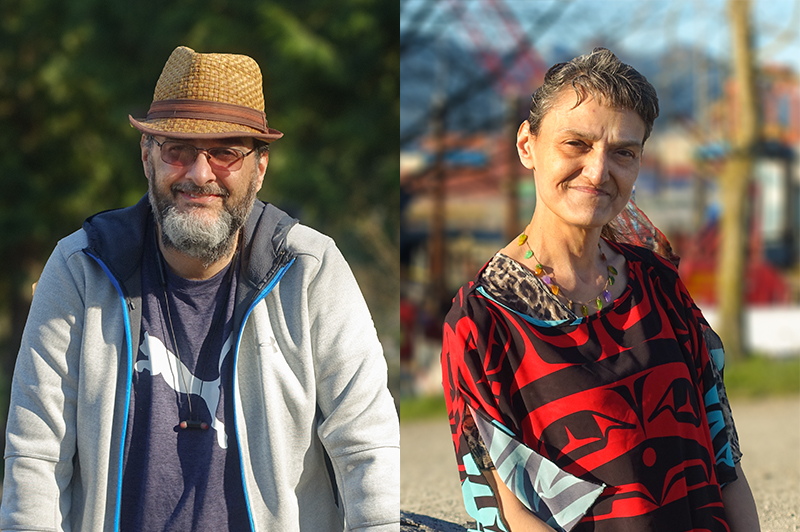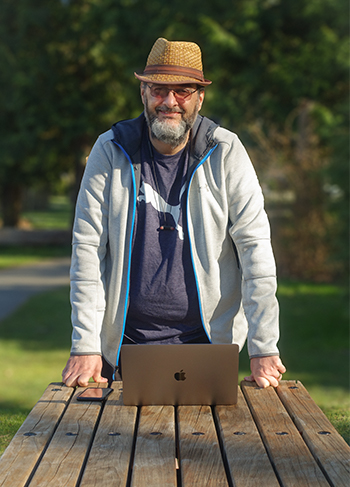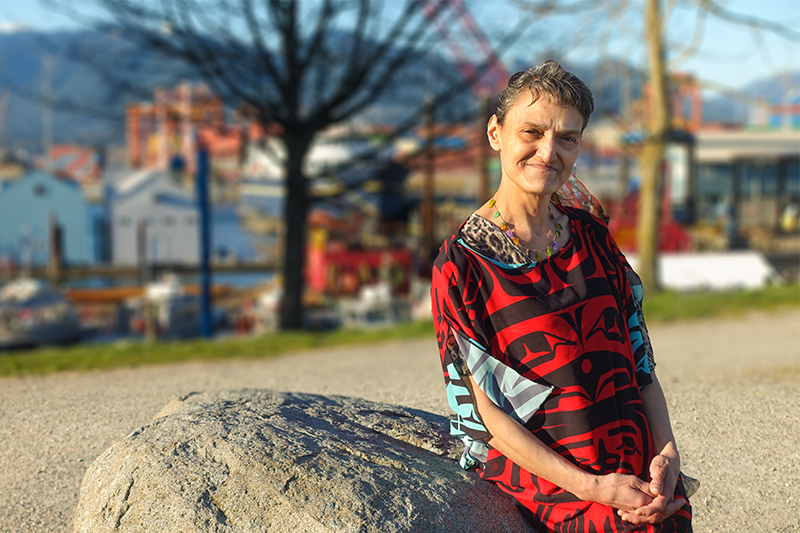How a made-in-the-DTES software tool called Linkvan provided paths to citizenship and confidence.
May 3, 2021
Story and photos by Geoff D’Auria, UBC Learning Exchange.

Fabio Lima (left), software developer, and Dianne Campbell, Pop-Up Tech Café ambassador.
For the last four years, Fabio Lima has had one goal—to become a Canadian citizen.
After coming to Canada to study, the newcomer from Brazil had three years to start his immigration application. And things were looking good. He quickly found a job as a project manager, an improvement—at least financially—over his first job in Canada as a parking valet. As long as he kept the job, he could apply for citizenship.
But in October 2019, he was laid off. He would have to find a new job, and quick, or his citizenship dreams could be dashed.
“I would do anything not to have to go back to Brazil,” Fabio said as he explained that the current political climate isn’t ideal for those with aspirations toward higher learning.
Fortunately, Fabio had also been honing other skills as volunteer software developer for an application called Linkvan. Linkvan is an app that helps connect Downtown Eastside residents with local services. It lists everything from laundry and food services to medical, shelter, and legal services.
The prototype was built by a UBC computer science student, guided by Downtown Eastside residents and organizations, and led by the UBC Learning Exchange through its partnership with the Downtown Eastside Literacy Roundtable.
“It’s more than just an app,” said Dionne Pelan. “It’s a project steeped in the principles of participatory design and the idea that everyone has something to teach and something to learn, everyone from residents in Vancouver’s Downtown Eastside to mid-career professionals like Fabio.”

Fabio Lima, volunteer software developer.
A DTES tech collaboration
Dionne should know. She is the Digital Literacy Programs Coordinator at the UBC Learning Exchange. Alongside William Booth from the Downtown Eastside Literacy Roundtable, she’s been leading the app development. But even Dionne was surprised by how the project evolved.
“We had been hearing from people that paper-based resource lists didn’t work for people—they got out of date quickly and fell apart when wet, which is a real problem for people without homes,” Dionne said.
As a result, Dionne and William hosted a series of forums at the UBC Learning Exchange to address this and other digital access and equity issues. The forum included 60 community members and representatives from local community organizations. Participants agreed that an app-based service would be more useful.
Guided by a working group of community members and representatives of local organizations, a UBC computer science student, Kevin Tanyag, built a prototype.
With the first iteration and a small SSHRC grant in hand, the team started to test the app. That’s when Dianne Campbell, a 20-year resident of the Downtown Eastside from the Saulteaux First Nation in Manitoba, got more involved.
Over six months, Dianne and others, including a digital literacy researcher from Simon Fraser University, Suzanne Smythe, talked to close to 60 people from a variety of backgrounds across the Downtown Eastside. About a third were experiencing homelessness, many others were living in SROs.
“We watched people try to use the app,” Dianne said, “and if someone wasn’t able to do something, we asked them why, what they were thinking, what made it difficult to do.”
“Because I knew them, people were more at ease. I was able to engage them on a personal level—ask them about their dogs, for example—and made them feel like someone understood their world and their lives.”
These “conversations at the interface,” as some would call them, revealed that the app needed to work for people with lower English skills, as well as lower digital literacy skills.
“It became more of a participatory design process,” Dionne said, as opposed to an executive approach where software developers make design decisions based on broad assumptions about the user.
Soon these conversations became as much about the user’s digital eco-system. “Beyond an app, there’s a whole suite of things we take for granted but are essential to digital access,” said Dionne, “like printers, a place to save your files, or just a quiet, safe place to work and practice.”
“The Vancouver Public Library and others, including the UBC Learning Exchange, offer low-barrier computer programs at their facilities. And these are critically important. But it didn’t seem like there was a lot of support for people out in the community. So, we developed Pop-Up Tech Cafés.”

Dianne Campbell, peer ambassador for Linkvan and the Pop-Up Tech Café program.
Pop-up Tech Cafés now happen in various places throughout the neighborhood (and currently online) to answer questions about personal technologies. They are opportunities for Downtown Eastside residents to ask questions about phones, computers, or any other personal technology.
“These were important lessons to learn as a project,” said Dionne. “And we couldn’t have learned them without help from community members like Dianne.”
In addition to helping run interviews for other community programs, Dianne is now a Pop-Up Tech Café peer ambassador.
“Working with Linkvan taught me how to talk people through computer problems,” Dianne said. “And by teaching people, I’m learning more myself. The panic I used to feel around technology I had has disappeared.”
A volunteer job, a path to citizenship
Dive through the Linkvan screen and into the lines of code and you’ll see the results of another “conversation at the interface,” one that helped Fabio find his way to Canadian citizenship.
Even though he chose business management as a career, Fabio has been enchanted with software his whole life. “Every single role I had in my life, I managed to build a software tool to help me do it,” he said.
The other thing Fabio had always done is volunteer but there’s always been a hitch. “I used to do volunteer work in Brazil, but I’m not exactly a people person. Most of the time, volunteering positions don’t fit my personality.”
When Fabio saw a chance to volunteer with Linkvan, he took it. He is now part of a team of three developers and a volunteer project manager that maintains and upgrades the software using an approach called “pair programming.”
“Instead of doing everything alone,” Fabio said, “you sit together at the same workstation (or Zoom call) and discuss everything you’re doing as you’re doing it. It’s a way to learn and it’s a way to teach. It’s really useful for untangling complex problems or for a senior programmer to teach a junior programmer quickly.”
During the early COVID-19 period, with services across the Downtown Eastside adjusting to pandemic realities, the Linkvan development team rapidly updated the app to keep the information current.
With his Linkvan experience, Fabio felt more comfortable broadening his job search into software jobs. He said that made all the difference. In December 2019, Fabio found a job as a software developer.
“Linkvan gave me the experience that showed an employer that I could do this job in a way that met the expectations in Canada.”
In January, Fabio submitted his application for Canadian citizenship, confident he now meets the requirements.
“That’s the thing about the UBC Learning Exchange,” said Dionne, “We provide the place and the space and encourage people to learn from each other. Whatever happens after that is out of our hands but is almost always positive and a little bit unexpected.”
Read more:
- The LinkVan Project: Participatory Technology Design in Vancouver, Language & Literacy, University of Alberta
- See all stories in the Learning Exchange In Action series.
Related stories

Four ideas from ‘Beat the Heat’

STUDENT VOICE: ‘I thought the DTES was broken. I was wrong.’

‘Our Stories’: Tales of love and loss, family and forgiveness